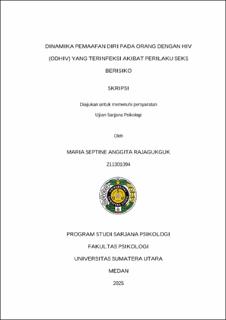Dinamika Pemaafan Diri pada Orang dengan HIV (ODHIV) yang Terinfeksi Akibat Perilaku Seks Berisiko
The Dynamics of Self-Forgiveness in People Living with HIV (PLWHA) Infected Through Risky Sexual Behavior

Date
2025Author
Rajagukguk, Maria Septine Anggita
Advisor(s)
Tuapattinaja, Josetta Maria Remila
Metadata
Show full item recordAbstract
Risky sexual behavior is closely associated with the transmission of Human
Immunodeficiency Virus (HIV). Individuals living with HIV often experience guilt
and shame, which may necessitate self-forgiveness to reduce these negative
emotions. This study aims to explore the dynamics of self-forgiveness in people
living with HIV (PLHIV) who were infected through risky sexual behavior.
Drawing on Cornish and Wade’s (2015) model, self-forgiveness involves four
components: responsibility, remorse, restoration, and renewal. This qualitative
research involved interviews with three participants. Findings revealed that two
participants, one homosexual and one heterosexual, were unable to reduce their
negative emotions, while another homosexual participant was able to do so. Each
participant exhibited a unique pattern of self-forgiveness. The homosexual
participant who did not succeed followed a sequence of responsibility, restoration,
remorse, and restoration. The heterosexual participant went through responsibility,
remorse, restoration, and returned to remorse. In contrast, the homosexual
participant who successfully reduced negative emotions experienced a longer
process, beginning with responsibility, followed by remorse, restoration, another
episode of remorse, and culminating in renewal.
Collections
- Undergraduate Theses [1451]
